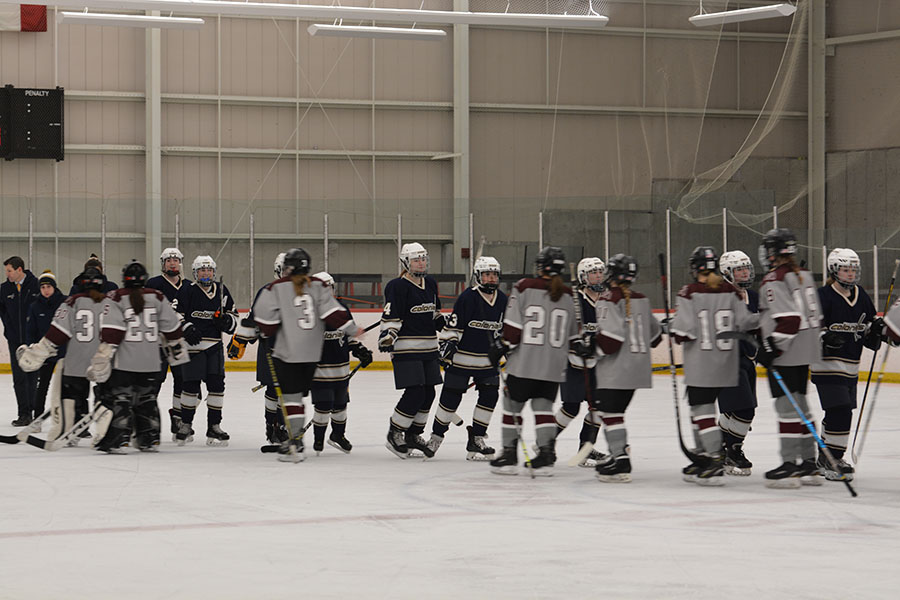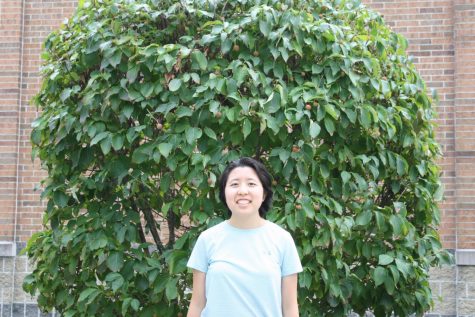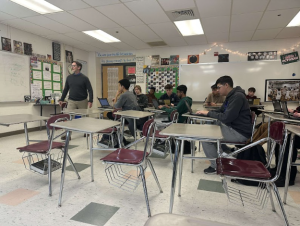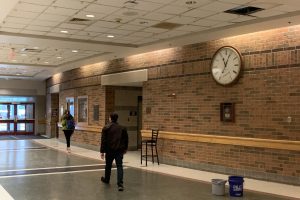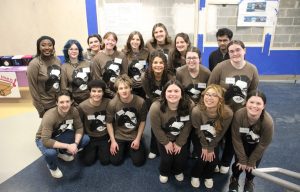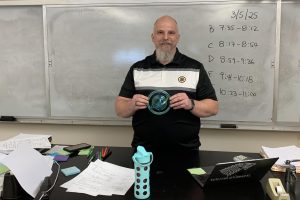Ice hockey, basketball cancelled due to rising COVID cases
The decision to cancel ice hockey and basketball comes after concerns over the inherent danger in contact sports and the risk of increased transmission.
December 8, 2020
With a 4-3 vote, the Westford School Committee decided to follow Superintendent Bill Olsen’s recommendation to continue alpine and nordic ski in-person and swimming and gymnastics virtually, with basketball and hockey being canceled entirely. The vote was held virtually on Monday, Dec. 7, preceded by a discussion about the safety of different winter sports.
This decision follows the MIAA COVID-19 Task Force’s announcement on Nov. 20 that winter sports will continue this year starting Dec. 14, while indoor track and wrestling will be moved to later seasons.
Although the fall sports season saw approval by the School Committee, this decision is to be revisited before the start of every sports season.
Although both alpine and nordic ski practices will take place outdoors, students and coaches are required to follow strict guidelines to ensure a healthy and safe environment. When not wearing gear, masks must be worn at all times and social-distancing guidelines of six feet between all individuals is mandatory. Additionally, coaches are expected to adhere to the established EEA guidelines in place for game management.
As for swimming and gymnastics, practices will be held in-person with social distancing required, while meets will be held virtually, with each team gathering separately. To align with COVID-19 safety protocols, students won’t be allowed in locker rooms in order to prevent close proximity, and all will be required to bring a bag of essentials to each practice. Just like with skiing, coaches must ensure social-distancing guidelines between all players and follow EEA guidelines.
Olsen’s main reasoning behind his recommendation was based on the upward tick in confirmed COVID-19 cases throughout the state of Massachusetts. The number of confirmed cases spiked upwards in November and continued rising into December, leading to a total of over 240,000 confirmed cases across the state.
“I’m extraordinarily concerned about the increase of COVID cases in this state and across the country right now […] That’s data that I have to pay attention to, it doesn’t only apply to those outside of Westford,” Olsen said.
The rise in cases also creates the possibility of transmission between students, and the risk of students transferring the virus directly to teachers and staff. With the average age spectrum of COVID-19 patients broadening to include middle-aged adults, Olsen feels as though his decision is the most logical when considering the safety of everyone at WA. Although he knows it may not be the most popular in the community.
“I hope that you’ll respect that decision because I’ve tried to throughout my career, and particularly right now, to make decisions that are empirically-based, and not emotionally-based,” Olsen said.
Even if there is no immediate spread, Dr. Michelle Travassos, at the meeting, emphasized that the mere exposure and subsequent quarantining of teachers and staff could greatly impact school operations.
“Acton-Boxborough High School was actually remote for two weeks, [and] not because they had spread in their school. It was because they had too many staff and students who were exposed, and they didn’t have enough faculty to run the school. As public schools, I feel so strongly that our focus has to be on education. […] We can’t have contact sports that are going to risk them shutting down,” Travassos said.
Stony Brook nurse and middle school cross-country coach Susan Hanly also argued that the current focus should be on going back to school full-time, before trying to consider extracurriculars.
“There’s countless disappointments, but I’m struggling because there’s 5000 students in this district, not just 300 winter sport athletes. And I personally feel as though the conversation has to be, get our kids back in school, first, before we are talking about playing contact sports,” Hanly said.
For student-athletes, however, their teammates act as a support system and a key to maintaining their mental wellness.
Meghan Mulhern, a senior captain of the girls’ hockey team, encompassed how important the possibility of playing is to those participating in winter sports.
“We all want nothing more than to play this season. We are ready to do, and I mean this sincerely, whatever it takes to make sure we remain safe and are able to play […] This program is a family, so much so that several captains from my freshman and sophomore year have reached out to me with well-wishes and encouragement to keep the season alive. Tonight, there are first-hand accounts of how impactful this program has been to each and every one of us,” Mulhern said.
Physician’s assistant Kimberly Schwab, mother to two winter sports players, also reiterated that fallout from mental health issues due to a lack of in-person interaction could be seriously detrimental.
“I have seen a significant rise in mental health issues, especially in the high school population, and almost all of them are linked to lack of sports, lack of being able to see their friends and lack of in person schooling. […] I fear that that [mental health issues] is going to skyrocket if we start taking more and more away from these kids,” Schwab said.
Additionally, many parents and student-athletes argued that the guidelines in place would already be more strict than what Governor Baker had originally intended.
“The Governor has approved basketball as a sport that can be played during this crisis. […] The Massachusetts Interschool Athletics Association then took these guidelines and made them more stringent […] After the MIAA […] approved Winter Sports participation, the Dual County League […] then made their adjustments,” girls’ basketball coach Russell Coward wrote in an email to the School Committee.
Parent Jannelle Cioffi, while speaking on behalf of hockey athletes, stated that athletes should, at the bare minimum, be given the opportunity to play.
“Athletes are different. […] They will follow any rules that you guys put forth. […] If it [the number of COVID-19 cases] goes up, then maybe close it down, but at least give them the chance,” Cioffi said.
However, one major point of contention was the possibility of athletes turning to less-regulated club sports.
In response, Michael Bonenfant, President of Nashoba Youth Hockey, explained that club sports were in fact safe when protocols were followed, but also that the schools would benefit from having control over sports.
“It’s a little incorrect to say that we haven’t had any instances of COVID […] but my point to that is that not one team has missed a game or practice because we’ve produced protocols. […] I don’t think they [students] will [continue to play on club teams] once they’re involved with the high school program,” Bonenfant said.
On the contrary, Dr. Travassos argued that club sports may continue even if there were to be school sports, therefore, the school’s decision should remain in the best interest of all the students.
“Kids are already playing in clubs […] I can’t imagine that’s going to change. And I think that as a school system, we have a different priority—the priority is supposed to be the education of our students,” Dr. Travassos said.
Lastly, Sanders proposed an alternative solution to ensure that everyone would be able to play winter sports this season. Sanders pitched the idea of making a ‘code-of-conduct’ contract, which would have students promise not to play club sports or participate in any other outside activities that would put them at risk for COVID-19.
“It’s my understanding that we’re not seeing a lot of community [COVID-19] spreading at school anyways,” Sanders said.
Antonelli stated that the contract could be an option to consider in the future, but that he would have to discuss beforehand with parents, players, and coaches of each team, for it to be a possibility.
Ultimately, although the vote yielded a decision adhering to Olsen’s recommendations, Miller emphasized how it is important to be consistent across the board with all COVID-related decisions, even if it was a difficult decision.
“As hard as it is, I think we have to have some consistency […] with the decision that we make regarding sports and the decisions that we’ve made regarding the classroom, and our other extracurriculars. […] I feel like we have to prioritize,” Miller said.

